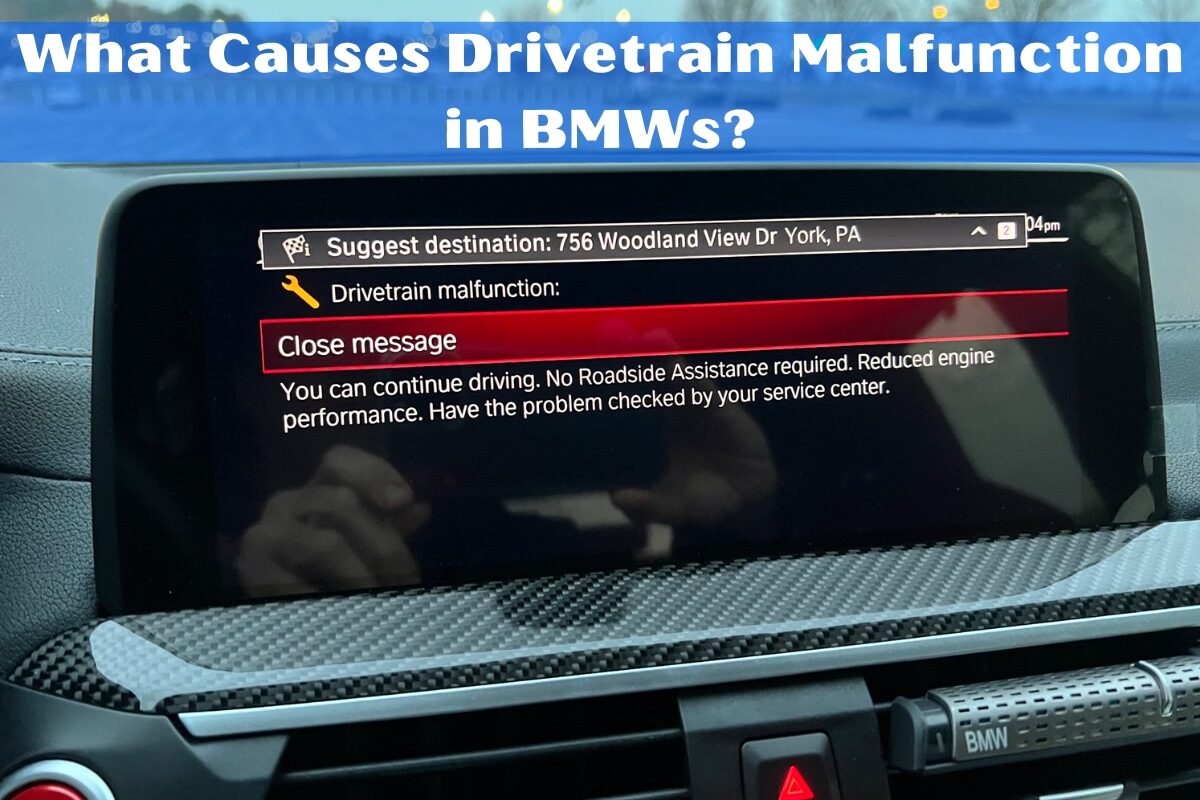What Causes Drivetrain Malfunction in BMWs?

As a BMW owner, encountering a “Drivetrain Malfunction” warning on your dashboard can be unsettling. This error indicates an issue with the system responsible for transferring power from the engine to the wheels. In this comprehensive guide, we’ll explore the common causes behind drivetrain malfunctions in BMWs and what you can do to address them.
The drivetrain is a crucial component of any vehicle, comprising the transmission, driveshaft, axles, and wheels. When any part of this system fails, it can lead to a drivetrain malfunction, potentially causing performance issues and further damage if left unresolved.
In this article, we will dive deep into the following topics:
- Understanding BMW’s drivetrain system
- Common causes of drivetrain malfunctions
- Signs to watch out for
- Troubleshooting and diagnostic steps
- Preventive maintenance tips
By the end of this guide, you’ll have a better understanding of what can cause drivetrain malfunctions in your BMW and how to tackle these issues effectively.
Understanding BMW’s Drivetrain System
Before we delve into the potential causes of drivetrain malfunctions, let’s briefly review how BMW’s drivetrain system works.
The drivetrain is responsible for transmitting the power generated by the engine to the wheels, enabling your vehicle to move. It consists of several components, including:
- Transmission: Transfers the engine’s power to the driveshaft and controls gear ratios.
- Driveshaft: Transfers power from the transmission to the differential.
- Differential: Distributes power evenly to the drive wheels.
- Axles: Connect the differential to the wheels.
All these components work in harmony to ensure smooth power delivery and efficient performance. Any issue within this system can trigger a drivetrain malfunction warning.
Common Causes of BMW Drivetrain Malfunction
Several factors can contribute to drivetrain malfunctions in BMWs. Here are some of the most common culprits:
Fuel System Issues
- Damaged or Clogged Fuel Injectors: Fuel injectors play a crucial role in delivering the correct amount of fuel to the engine’s combustion chambers. If they become damaged or clogged, it can lead to poor combustion, power loss, and ultimately, a drivetrain malfunction.
- Faulty High-Pressure Fuel Pump: The high-pressure fuel pump is responsible for supplying fuel from the tank to the engine under high pressure. A failing pump can cause inconsistent fuel delivery, resulting in power fluctuations and potential drivetrain issues.
- Using Low-Quality or Low-Octane Fuel: BMWs are designed to run on high-octane fuel. Using low-quality or low-octane fuel can cause incomplete combustion, leading to performance problems and possible drivetrain malfunctions over time.
Ignition System Problems
- Worn-Out Spark Plugs: Spark plugs are essential for igniting the air-fuel mixture in the engine’s combustion chambers. As they age, they can become less effective, causing misfires and power loss, which can contribute to drivetrain malfunctions.
- Faulty Ignition Coils: Ignition coils provide the electrical voltage necessary for the spark plugs to function properly. If they fail, it can lead to misfires, rough idling, and potential drivetrain issues.
- Failing Oxygen Sensors: Oxygen sensors monitor the air-fuel mixture and help the engine management system make adjustments for optimal combustion. If these sensors malfunction, it can cause incorrect air-fuel ratios, leading to performance problems and potential drivetrain malfunctions.
Exhaust System Concerns
- Clogged Catalytic Converter: The catalytic converter is responsible for reducing harmful emissions from the exhaust system. If it becomes clogged, it can create backpressure and interfere with the engine’s performance, potentially causing drivetrain issues.
- Exhaust Leaks or Blockages: Leaks or blockages in the exhaust system can disrupt the flow of exhaust gases, leading to increased backpressure and potential drivetrain malfunctions.
- Failing Exhaust Manifold: The exhaust manifold collects and routes exhaust gases from the engine’s cylinders. If it develops cracks or leaks, it can lead to performance issues and potential drivetrain malfunctions.
Other Potential Culprits
- Low Engine Oil Level: Insufficient engine oil can cause excessive friction and wear, potentially leading to drivetrain issues.
- Transmission Fluid Leak: A leak in the transmission fluid can cause the transmission to operate inefficiently, potentially leading to drivetrain malfunctions.
- Worn Drivetrain Components: Over time, components like the driveshaft, axles, and CV joints can wear out, causing vibrations, noise, and potential drivetrain malfunctions.
Signs of Drivetrain Malfunction in BMWs
In addition to the “Drivetrain Malfunction” warning on your dashboard, there are several other signs that may indicate a problem with your BMW’s drivetrain:
- Loss of Power or Acceleration Issues: If you notice a significant drop in power or difficulty accelerating, it could be a sign of a drivetrain malfunction.
- Unusual Noises or Vibrations: Strange noises or vibrations coming from the drivetrain area, especially while accelerating or changing gears, can indicate a problem.
- Transmission Shifting Problems: If your transmission seems to be shifting gears erratically or harshly, it could be a symptom of a drivetrain issue.
- Check Engine Light: While not always directly related to the drivetrain, the check engine light can sometimes illuminate due to a drivetrain-related issue.
If you notice any of these signs, it’s essential to have your BMW inspected by a qualified technician as soon as possible to prevent further damage.
Troubleshooting Drivetrain Malfunctions
If you encounter a drivetrain malfunction in your BMW, there are a few steps you can take to help diagnose and address the issue:
- Restart the Engine: Sometimes, a simple engine restart can reset the system and clear the malfunction warning temporarily. This can help you get to a safe location or a service center.
- Scan for Error Codes: Using an OBD-II scanner compatible with BMWs, you can read any diagnostic trouble codes (DTCs) related to the drivetrain malfunction. These codes can provide valuable insight into the specific issue and guide further diagnosis.
- Inspect Components: Visually inspect the drivetrain components for any signs of wear, leaks, or damage. This can help identify potential problem areas and expedite the repair process.
- Seek Professional Diagnosis: While these steps can provide some initial insight, it’s highly recommended to have a qualified BMW technician perform a thorough diagnosis. They have the specialized tools and expertise to identify the root cause and recommend the appropriate repairs.
Preventive Maintenance for Drivetrain
To minimize the risk of drivetrain malfunctions in your BMW, regular preventive maintenance is crucial. Here are some tips to help keep your drivetrain in top condition:
- Follow Service Intervals: Adhere to the recommended service intervals for your BMW, as outlined in the owner’s manual. This includes regular oil changes, fluid flushes, and inspections.
- Use Recommended Fluids and Parts: Always use the fluids and replacement parts recommended by BMW. Using subpar or incompatible products can lead to premature wear and potential issues.
- Avoid Aggressive Driving: Aggressive driving habits, such as excessive acceleration, hard braking, and high-speed cornering, can put additional stress on the drivetrain components and increase the risk of malfunctions.
- Watch for Warning Signs: Be attentive to any unusual noises, vibrations, or performance issues that may indicate a potential drivetrain problem. Addressing issues early can prevent further damage and costly repairs.
By following these preventive maintenance steps, you can help extend the lifespan of your BMW’s drivetrain and reduce the likelihood of encountering malfunctions.
A drivetrain malfunction in your BMW can be a frustrating and potentially costly issue if left unaddressed. By understanding the common causes, such as fuel system problems, ignition issues, exhaust system concerns, and worn components, you can be better prepared to identify and address potential problems.
Remember, promptly addressing any drivetrain malfunction warning is crucial to prevent further damage and ensure safe and reliable performance. If you encounter any signs of a drivetrain issue, don’t hesitate to have your BMW inspected by a qualified technician.
Preventive maintenance, including regular service intervals, using recommended fluids and parts, avoiding aggressive driving habits, and being attentive to warning signs, can go a long way in minimizing the risk of drivetrain malfunctions. By taking a proactive approach to maintaining your BMW’s drivetrain system, you can enjoy a smooth and enjoyable driving experience for years to come.
It’s important to note that while some troubleshooting steps, such as restarting the engine or scanning for error codes, can provide temporary relief or insight into the issue, a professional diagnosis is often necessary to identify and resolve the root cause effectively. Attempting complex repairs without the proper expertise and tools can potentially lead to further complications and costly mistakes.
Ultimately, the key to addressing drivetrain malfunctions in BMWs is a combination of awareness, prompt action, and seeking professional assistance when needed. By staying vigilant, following recommended maintenance practices, and working with qualified technicians, you can ensure your BMW’s drivetrain remains in top condition, providing you with the performance and reliability you expect from a premium German automotive brand.






